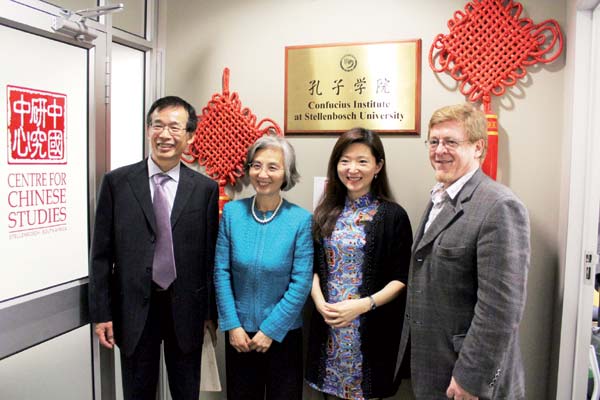 |
|
Robert Kotze, co-director of the Confucius Institute at Stellenbosch University in South Africa, says universities provide a stable environment and an eager audience. Provided to China Daily
|
Robert Kotze, co-director of the Confucius Institute at Stellenbosch University in South Africa, says the unique model has helped Confucius Institutes to generate positive results and expand their reach in a short time.
"Universities usually provide a stable environment and an eager audience," he says.
As China's involvement on the continent becomes more prominent, Africans are eager to learn the Chinese language.
Earlier this year, South Africa's education minister approved a plan to introduce Chinese in the country's school curriculums, starting with 16 pilot schools.
"We hope to learn from the Chinese experience through exchanges of knowledge and human capital, which we believe will be extremely beneficial," Angie Motshekga, South Africa's minister for basic education, said in a speech at Shanghai's East China Normal University during her visit in February.
"There are currently six Confucius Institutes in South Africa. And with the help of the Chinese government, a curriculum for the teaching of Chinese will be developed and offered in schools around the country."
Director of the Confucius Institute at South Africa's Rhodes University Marius Vermaak says that, since the school opened the Confucius Institute in 2009, the number of students studying Chinese has kept pace with those studying more conventional languages.
Currently the program offers a three-year bachelor's degree and has an annual intake of 40 students.
Vermaak says the number is growing. Annual enrollments are expected to reach 100 in two years.
"We're bigger than Afrikaans. We're bigger than German," Vermaak says.
Prior to the Confucius Institute's opening, the small liberal arts college with 8,000 students offered no Chinese-language programs. It was the intention of bringing a new language to the school that swayed Vermaak to explore the Confucius Institute option when the Chinese embassy approached him in 2008.
"I thought it was blindingly obvious that China will be a major factor in our students' lives for the bigger part of the 21st century," he says.
Rhodes University partnered with China's Jinan University, which was responsible for helping develop the program's curriculum and providing the teaching staff, to offer a Chinese-language degree within a year.
"Right from the start, we offered a serious academic program. This was not going to be a club somewhere on the margins of the university. Right away, it was established as a school of language and part of the school of humanities," Vermaak says.
Their efforts have paid off. Last year, Rhodes University was declared a model Confucius Institute along with the program at the University of Nairobi in Kenya. By 2015, it hopes to expand its program to include a master's degree in Chinese.
Other plans include the development of a Chinese Studies Center for research on Sino-African ties, Vermaak says.
Vermaak attributes much of the success to the Hanban's continued support, even four years after the center was opened.
As outlined by the enthusiastic expansion plans for Rhodes, the benefits for a university receiving funding from the Hanban are vast.
According to reports, host universities can receive between 315,000 yuan ($50,000) and $100,000 as initial funds to help establish the center, and also an annual upkeep fund based on program size.
But the benefits go both ways, Vermaak says.
"You should not think of Confucius Institutes as one-way conduits. They act as important meeting places and the benefits go both ways," he says.
"Chinese are working hard to internationalize and to gain as much experience as possible from other parts of the world. We are playing an important role in helping them do that."
Following their partnership with Rhodes University, the Guangzhou-based school established an Institute for African Studies, largely because of the support Rhodes provided.
Rhodes has also provided guest professors to China, who teach in Shandong's provincial capital Jinan, Vermaak says.
While many schools look to the Confucius Institute as a way to establish language programs, it is the great potential for academic exchange that benefits those with Chinese-language instruction already in place.
This was what prompted Stellenbosch University to integrate its Confucius Institute into the school's postgraduate and international office in 2009.
We recommend:
